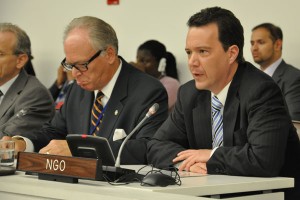On Wednesday morning, nongovernmental organizations made presentations to the U.N. Arms Trade Treaty (ATT) conference. Heritage’s Ted R. Bromund, senior research fellow in Anglo-American relations in the Margaret Thatcher Center for Freedom, spoke as follows:
Thank you, Mr. President, for the opportunity to offer written remarks to be placed in the record of this conference. My name is Dr. Ted R. Bromund. I am senior research fellow in Anglo-American relations at The Heritage Foundation, a leading conservative think tank based in Washington, D.C., with over 700,000 individual members. The views I express in this statement are my own.
Supporters of the ATT argue that we need it to raise national standards on the import, export, and transfer of arms. But if any nation wishes to raise its standards, it is free to do so now. The fact is that many U.N. member states have neither the desire nor the ability to raise their standards. A treaty will not compel or enable them to do so.
The U.N. Security Council has adopted embargoes against the shipment of arms to particular nations. It has called on all U.N. member states to eliminate the supply of arms to terrorists. These embargoes and resolutions are regularly violated.
The ATT’s proponents claim that this is why we need the ATT. But it is a fantasy to believe that a universal ATT, backed by nothing more than the words of the treaty itself, will succeed where the Security Council, backed by the authority of Chapter 7 [of the U.N. charter], has failed.
The ATT will not limit the ability of terrorists to acquire arms. The reason for this is simple: The U.N. has never defined terrorism, because some member states insist that terrorist groups like Hamas are struggling against so-called foreign occupation.
This points to a basic fact: It is member states that, by design or negligence, arm terrorists and violate existing embargoes. What is needed is not a new treaty on the arms trade. It is nations that are willing and able to uphold the commitments they have already made.
An ATT based on easily politicized criteria will create unparalleled opportunities for lawfare against law-abiding democracies. With its vast scope, it will be another aspirational treaty that has no effect on the autocratic member states of the U.N. Indeed, the ATT will legitimate the worst aspects of the arms trade by asserting that the U.N. charter recognizes the right of even dictatorial nations to buy, sell, and transfer arms.
I hope the democracies at this conference will reject the naive beliefs on which the ATT is founded and instead craft a treaty that recognizes that abuses in the arms trade stem ultimately from the member states of the United Nations itself.































5 Replies to “Heritage Analyst Speaks to U.N. Arms Trade Treaty Conference”